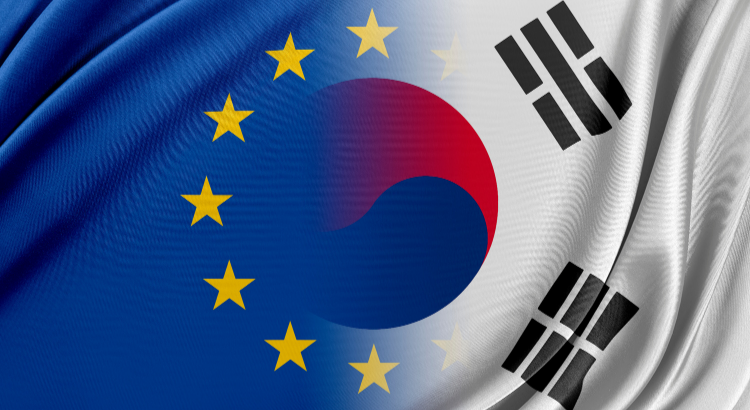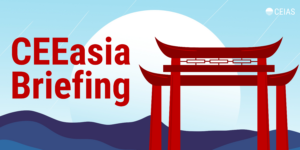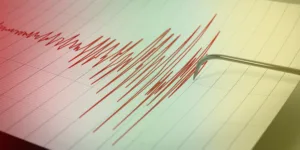The European Union (EU) and the Republic of Korea (ROK) are important strategic and economic partners, and they share similar values stemming from their liberal-democratic systems. Their relationship has developed immensely over the previous years – yet there is still a perception that somehow it does not entirely reach its full potential. What has been achieved in the EU-ROK relations previously, what are the next steps to be taken – and how China comes into play?
This article summarises some of the main findings of the CEIAS project “Coping with China: Public attitudes in South Korea and Europe as the basis for effective policy collaboration”, funded by the Korea Foundation. It also draws on the ideas discussed during the event that CEIAS organized on 15 December 2022, including Michael Reiterer (Former Ambassador of the EU to the ROK), Hae-Won Jun (Associate Professor at the Institute of Foreign Affairs and National Security), Su-Jeong Kang (Assistant Professor, Chosun University), and others.
The development of the EU-ROK relationship
Looking at the history of the relations, the European Economic Community and the Republic of Korea established their diplomatic relations in 1963. Initially, the focus of the relations was primarily economic, although it started to pick up pace only after the South Korean market started to open more widely in the 1980s. Gradually, together with the occurring democratization in South Korea, the ROK started to be also considered an important political partner among European political representatives. Later on, Korean culture has become widely popular in Europe. The EU member states have also become interested in broadening the cooperation between universities and research institutions in modern technologies related to semiconductors and high-definition television, where South Korea has become a world leader.
Trade and investment relations have been steadily evolving especially since the late 1990s. In recent years South Korea has become the 9th most important export and import partner for the EU. Since 2011 we can see an increase in both imports and export from around € 30 billion to over € 50 billion. In 2011 the export from the EU was the lowest, in ten years it increased from € 30 billion to € 52 billion in 2021. Imports started at € 34 billion and increased to €55 billion in 2021.
When it comes to investment we can distinguish two groups among the EU member states: those who are predominantly investing in South Korea and those who are on the receiving side of Korean investments in Europe.
From the Central European perspective, Korean investments have been the key feature of relations with the ROK since the 2000s. The South Korean investments are directed at manufacturing, R&D, and real estate. The investments in automotive and electronic sectors are located primarily in Central and Eastern European Union member states – Slovakia, for instance, hosts the KIA plant producing cars for the European market or a large facility of Samsung producing electronics.
When it comes to investments in South Korea, the EU has been the most important source of foreign direct investments in South Korea and is estimated to account for about a third of the entire FDI in the country. The EU FDI is generally focused on finance, business, services and construction, and the manufacturing sector. Based on the available data, the Netherlands is the biggest investor, followed by Germany and France.
Moving to the more recent development of the EU-ROK relationship, and looking through the lenses of bilateral partnerships of the EU in the Indo-Pacific, the partnership with South Korea is one of the more successful ones. The relationship is currently based on three agreements signed over the course of the 2010s – the Free Trade Agreement, and Framework Agreement signed in 2010, and the Crisis Management Participation Agreement of 2014. In addition, South Korea became an EU strategic partner in 2010.
Although these agreements boosted the relations in a significant way and around 40 dialogue channels were open, there is still a perception that the full potential of the EU-ROK relationship has not been reached. Challenges and potential joint responses to them will be discussed subsequently in this paper.
Challenges for EU-ROK strategic partnership
The existing challenges for the EU-ROK strategic partnership can be identified on two levels: those coming from the current development in international relations, and those stemming from the bilateral ties.
Firstly, China’s rise and its increasingly assertive behaviour in foreign relations represent a challenge for both the EU and the ROK. Naturally, being in China’s immediate neighbourhood, South Korea is more prone to geopolitical dynamics than faraway Europe. Specifically, China plays an important – although contradictory – role in terms of its relations with North Korea, where it may be seen as part of the problem but also as a solution, depending on the circumstances. In any case, the proximity to China and the North Korean factor may prevent the South Korean governments’ from taking anti-China positions for fear of possible geopolitical repercussions.
What represents a similar challenge to both EU and the ROK is the issue of economic dependence on China, which creates a potential for both sides to work together on contingency plans. Especially, the supply chain disturbances due to the pandemic and strict lockdowns in China proved the vulnerability of both partners. As a result, this is an area which the EU and the ROK addressed partially in their digital partnership agreement signed on November 28, 2022.
Zooming out, the Sino-US rivalry poses also similar challenges for both the EU and the ROK as they struggle, to some extent, to find a position for themselves. On the one hand, they both highly value and clearly prefer the US as their main strategic partner – including when it comes to security issues stemming directly from China. On the other hand, they also do not want to become victims of the worsening US-China relations – China remains their important economic partner, but – above all – a partner to address various transnational issues which cannot be dealt with without engaging China.
As such, the similar visions of the EU and the ROK in terms of navigating the growing rivalry between the US and China can serve as the catalyst for developing a closer relationship to secure their strategic autonomy and expand their space for diplomatic manoeuvring.
The Russian invasion of Ukraine reminded the EU and the ROK of the necessity to uphold and strengthen the rule-based international order and support regional structures focused on peace, stability, and development. In addition, it brought the security environment of both partners closer. For South Korea, the primary security concern remains North Korea and specifically its nuclear threat. Listening to statements from Moscow since the start of the war in Ukraine related to tactical nuclear weapons deployment brought the nuclear issue back to the forefront of the European security environment as well. Here is yet another shared challenge and opportunity for deepening cooperation.
To move on towards the bilateral issues, in the EU-ROK relationship we can identify several challenges that need to be addressed in the future. The first is related to the implementation of the agreements. Even though the bilateral relations are rooted in the three mentioned agreements, and multiple channels and forums of communication and cooperation exist, the relation still lacks better and more thorough practical application of issues discussed or agreed upon in documents. This is an issue often mentioned in academic publications as well as at international forums by representatives on both sides.
The second challenge is part of the Free trade agreement which was when signed in 2010, the first of the new-generation FTAs the EU has signed and the second-largest FTA in history. However, the world has changed in the last decade. The area not sufficiently covered in the agreement is e-commerce which has grown even more significantly in the last two years of the global pandemic than before. The new digital partnerships stipulate the need to discuss, share information and coordinate approaches especially when it comes to protectionist measures in third countries. However, these issues need to also be addressed in those bilateral relations.
Another challenge we identify in mutual relations is still a rather low level of people-to-people relations and awareness about the EU among the South Korean population that would go further than tourist destinations. The same can be said about European’s awareness of South Korea, even though knowledge of some aspects of Korean culture, for instance, is increasing due to the ‘Korean wave’.
Possible areas of cooperation
Besides the need to work on the implementation of the existing agreements and possible update of the FTA, the focus on public diplomacy seems to be one of the urgent areas to broaden the mutual understanding among people as an important factor for strengthening the strategic partnership as well as cooperation on the issues such as the environmental crisis, but also security of the supply chain and modern technology that affect the everyday life of all of us.
Among the recent activities in bilateral relations, the EU and ROK signed a digital partnership on November 28th 2022. We will only see how successful the implementation of the document is, however, it aims to enhance digital cooperation and deliver concrete results in collaborative research, semiconductors research and resilience against disruption of the global supply chain, quantum technologies and high-performance computing, 5G and 6G, online and digital platforms cooperation, artificial intelligence, and digital trade. In addition, the partnerships document mentioned the need to build skills among young people, and the necessity to adopt laws and systems related to the free and trusted flow of data, that is related to the digital identity area. The document stipulates the necessity to create a mechanism for safe ways for information sharing, especially related to issues of cyber security and trust building in this area.
Additionally, the last years of the global pandemic showed us how vulnerable the medical supply chain is, especially in the EU, and how high the dependency on one provider of medical equipment is. In this area, the ROK proved to be a reliable partner.
Looking outside of the bilateral partnership, emphasizing the strategic character of EU-ROK relations, cooperation with and in third countries is an area for further strengthening. If we talk about the challenges presented by the competition between the US and China, other actors are facing the same issue, especially in the Indo-Pacific region. Both partners already cooperate in maritime security – South Korea participates in the ATALANTA mission of the EU in the Gulf of Aden. In addition, the EU has a new mission in the north Indian Ocean, which also opens the door for maritime cooperation. The maritime area is key for both partners as securing the maritime roads is necessary for the stability and physical security of the supply chain.
EU signed recently (October 17, 2022) a Comprehensive Air Transport Agreement with ASEAN that replaces existing bilateral aviation agreements of member states with ASEAN members. Alongside rules for fair competition, transparency and commitment to improving social and labour policies the agreements stipulate the creation of a forum for regular meetings and mechanisms for dispute solutions. At the same time, the South Korean former government has focused on the improvement and expansion of ties with ASEAN to better protect its trade from risks caused by the US and China frictions. This position is not expected to change under the current government who is preparing to publish its Indo-Pacific Strategy.
In light of the competition between the US and China, it is only natural to expect that the EU, as well as South Korea, will focus their attention to decrease their dependency on either of the powers, especially in terms of trade and economy.
This article was produced as part of the project “Coping with China: Public attitudes in South Korea and Europe as the basis for effective policy collaboration”, funded by the Korea Foundation.









